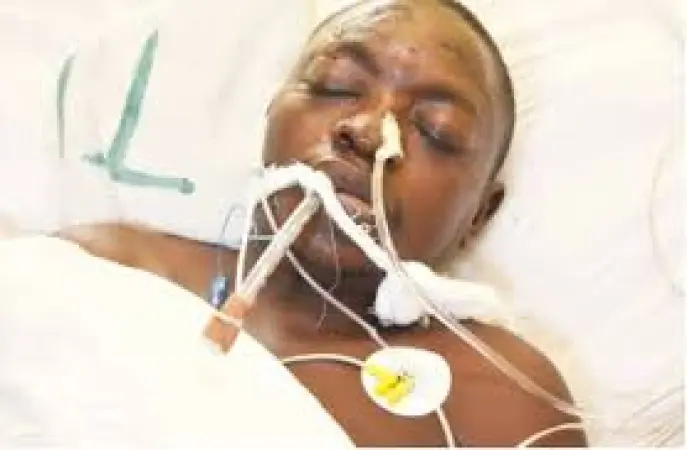In a dramatic turn of events, the National Hospital Abuja is urgently calling on Nigerians to help identify a middle-aged man who was found unconscious after a road traffic accident. The man, who has been receiving treatment at the hospital since December 21, 2024, is still unidentified, and hospital authorities are concerned about his well-being and the lack of information about his family.
Dr. Tayo Haastrup, the spokesperson for the National Hospital, issued an official statement via social media on Sunday, urging the public to come forward with any information about the man’s identity. “The individual in question was brought to us by a Good Samaritan who found him along the Jabi Expressway in a highly disoriented state,” Dr. Haastrup explained. “Since his arrival, our medical team has been doing everything in their power to provide him with the necessary care, but we are now reaching out to the public to help us reconnect him with his loved ones.”
The man was reportedly discovered in a critical condition following a collision on one of Abuja’s busiest roads, the Jabi Expressway. After the Good Samaritan rushed him to the hospital, he was immediately admitted to the Trauma Intensive Care Unit (ICU), where doctors have been working tirelessly to stabilize his condition. However, without proper identification, the hospital has faced difficulties moving forward with some of the necessary procedures.
Dr. Haastrup emphasized that the hospital is not requesting any financial contributions at this stage, despite some concerns from social media users who feared the hospital may be pressuring relatives to settle medical bills before treatment. “We are simply seeking identification of the man so we can ensure his treatment continues seamlessly, and we can reunite him with his family,” Dr. Haastrup clarified.
The Situation at the National Hospital: A Race Against Time
The circumstances surrounding this incident highlight a troubling aspect of Nigeria’s emergency healthcare system. While the National Hospital Abuja is praised for providing immediate care, the case has drawn attention to the challenges hospitals face when dealing with unidentified patients. The ICU is currently providing the victim with lifesaving treatment, but there is growing concern about what will happen if he does not recover soon or if his family does not come forward.
Many Nigerians took to social media to express their concerns, including a particularly emotional message from Remilekun28, who shared, “May God bless the Good Samaritan that took him to the hospital and I pray for his quick recovery.” Others echoed the sentiment, offering thoughts and prayers for the accident victim. However, one comment, from JASONjnr, pointed out the persistent problems with Nigeria’s healthcare system, which often lacks sufficient support. “If only our health insurance system was functional, this wouldn’t be an issue,” they remarked, adding that Nigeria’s National Identification Number (NIN) system could also help in cases like this if fully operational.
While these comments are reflective of a larger conversation about Nigeria’s healthcare infrastructure, the focus for now remains on this particular case. Many have urged people who may have relatives missing in the Abuja area to visit the National Hospital’s Trauma ICU for possible identification. The hospital’s appeal remains open for anyone with information to come forward and assist.
Social Media Reactions: A Mixed Bag
The public’s response to the hospital’s plea has been varied, with many people expressing genuine concern for the victim’s well-being. However, others have raised questions about the hospital’s motivations and its treatment policies. Some users, like Atarakpa, praised the hospital’s approach, noting that it contrasts with many Nigerian hospitals that demand deposit payments before treatment is provided. “I give it to the hospital for immediately administering treatment without asking for money upfront, unlike other hospitals in Nigeria,” Atarakpa remarked.
But others, such as ChiefOloye, voiced suspicions, suggesting that the hospital’s true motivation could be to push the victim’s relatives into paying for treatment. “They’re probably tired of providing free care and want the relatives to show up and pay the bills,” they said. While this theory remains unproven, it highlights the challenges and mistrust that sometimes exist between the public and healthcare institutions in Nigeria.
As the story continues to unfold, some Nigerians have called for better emergency preparedness, particularly the need for people to carry emergency contact information. WilsonBright935 shared, “This is why I always encourage people to add emergency contacts to their phone lock screens. It could save lives.”
Calls for Action: Strengthening Nigeria’s Emergency Healthcare System
This tragic case has also sparked larger conversations about the state of emergency healthcare in Nigeria. Several people have pointed out that the lack of an effective emergency identification system is one of the reasons the victim remains unidentified. A few social media users suggested that the National Health Insurance Scheme (NHIS) should be expanded and more widely implemented to prevent such situations from arising in the future.
“Could this be an opportunity for the government to reevaluate how we handle emergency medical situations?” asked DimIsaac10. “A proper identification system like the National Identity Management Commission (NIMC) could have helped speed up the process of identifying this person and even possibly saved his life.”
Despite these concerns, the hospital is determined to continue providing care for the man. However, it remains uncertain how long the victim can sustain treatment without further identification or support from family members. Dr. Haastrup, while hopeful for a positive resolution, is calling on anyone who may have information to come forward as soon as possible.

